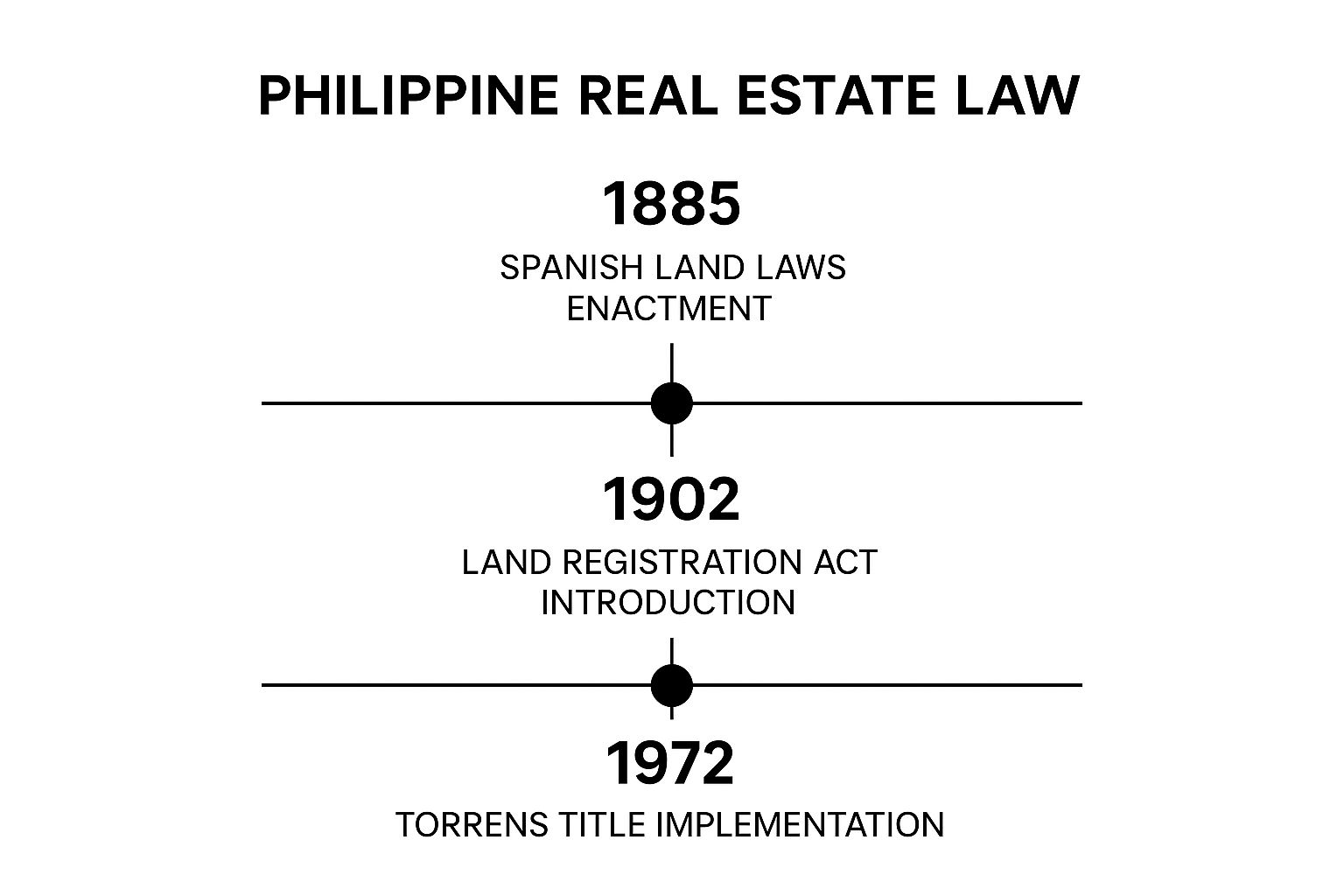Understanding The Foundation Of Property Rights In The Philippines
The Philippine real estate market operates within a unique legal framework shaped by centuries of history. From Spanish colonial rule to the American-introduced Torrens system, understanding this evolution is key to navigating property transactions in the Philippines.
Historical Influences on Philippine Real Estate Law
The timeline below highlights three pivotal moments in the development of Philippine real estate law, showcasing the shift from Spanish to American influence and the eventual adoption of the Torrens system.

This infographic illustrates the gradual evolution of these laws, each stage building upon the last to create the secure system we have today. This historical context informs our understanding of current property rights. Colonial policies and agrarian reforms have also significantly impacted Philippine real estate law. The Land Registration Act No. 496 of 1903, introduced during the American period, established the Torrens system in the Philippines. This was a critical step toward secure land ownership. The system provided centralized land registration and issued titles considered conclusive and permanent, a significant advancement from the previous Spanish regulations. For a deeper dive into this history, see: Timeline and History of Private Land Ownership in the Philippines.
The Regalian Doctrine and the 1987 Constitution
The Regalian Doctrine is a cornerstone of Philippine property law. This doctrine states that all land ultimately belongs to the state. This means private individuals own land conditionally, subject to the state's authority. The 1987 Philippine Constitution, however, provides important protections for private property owners. It guarantees due process and just compensation for private property taken for public use. This framework balances the state's interests with individual property rights.
Land Classification and Ownership Structures
The Philippine government classifies land for specific uses, including agricultural, residential, and commercial. These classifications affect how land can be used and developed. Various ownership structures exist within this framework. Individuals can own land, though foreign ownership is restricted. Corporations and other entities can also own land, subject to specific regulations. Understanding these classifications and ownership structures is essential for anyone involved in Philippine real estate. They influence market dynamics and investment strategies, making this knowledge critical for both individual buyers and businesses looking to lease or invest. A firm understanding of these principles allows for informed decisions and ensures investments are legally sound.
Navigating Foreign Ownership Rules And Investment Strategies

For international investors, understanding the complexities of Philippine real estate law is essential. The 1987 Philippine Constitution outlines specific restrictions on foreign land ownership, significantly impacting investment strategies. While foreigners cannot directly own land, there are legal ways to invest in property. This section will explore those options and discuss how to navigate them effectively.
Understanding Restrictions and Opportunities
The Philippine Constitution restricts foreign nationals from direct land ownership to protect national patrimony. However, foreigners can own buildings and condominium units. They just can't own the land underneath these structures. This legal framework has shaped the property market, especially in metropolitan areas like Metro Manila. The impact of these restrictions is clear: over 60% of foreign real estate acquisitions are condominiums in Metro Manila due to this legal structure. Learn more about property rights in the Philippines here. This focus on condominium ownership presents both challenges and opportunities for foreign investors.
Long-Term Lease Agreements: A Practical Solution
One common strategy used by foreign investors is securing long-term lease agreements. These agreements can last up to 50 years, with renewal options. This offers a practical alternative to direct ownership, providing long-term property access. For example, a business looking to operate in the Philippines can lease office space or a commercial building for an extended period, providing stability for long-term planning. This approach allows foreign investors to establish a presence in the market despite ownership restrictions.
Investment Strategies for Commercial Real Estate
Foreign investors can also invest in commercial buildings. This can be an attractive option for larger-scale investments. A foreign company might purchase an entire office building and then lease the space to local businesses, generating substantial returns. This strategy provides a way to participate in the Philippine real estate market while complying with legal requirements. The growing Business Process Outsourcing (BPO) industry also presents opportunities for foreign investors interested in seat leasing arrangements.
Documentation and Due Diligence: Keys to Success
Successfully navigating the Philippine real estate market as a foreign investor requires careful attention to detail and documentation. All transactions must strictly adhere to Philippine law. Securing experienced legal representation is vital. A lawyer specializing in real estate can protect your interests and ensure a smooth transaction. Due diligence is equally crucial. This includes thoroughly researching property titles and conducting background checks. These steps are essential for protecting against fraud and legal disputes, minimizing risks, and building a strong foundation for successful long-term investments. By understanding the restrictions, using strategies like long-term leases, and prioritizing proper documentation and legal counsel, foreign investors can build successful property portfolios in the Philippines. This proactive approach ensures compliance and maximizes potential returns in a dynamic and growing market.
How Agrarian Reform Laws Shape Modern Property Rights

Understanding Philippine real estate law requires a look at the history of agrarian reform. These reforms have significantly changed the property landscape, particularly in rural areas. This historical context shapes current ownership patterns, transaction requirements, and investment opportunities in the Philippine countryside.
From Homesteads to Leaseholds: A Shift in Land Ownership
The journey of agrarian reform in the Philippines began with the 1903 Public Land Act. This act established a homestead system, encouraging private land ownership and cultivation. It marked a shift away from vast estates towards individual ownership. However, this initial system didn't fully resolve the persistent issues of land inequality. Many tenant farmers still lacked secure access to the land they worked.
The Agricultural Land Reform Code of 1963 and Its Lasting Impact
A significant turning point came with the Agricultural Land Reform Code of 1963 (Republic Act No. 3844). This law aimed to correct the historical imbalance of land ownership. The code abolished share tenancy, where tenant farmers paid a portion of their harvest to landowners. Instead, it established leasehold arrangements, providing tenant farmers with greater security and control over the land they farmed. The 1963 Code imposed a retention limit of 75 hectares for landowners. It also granted tenant farmers the rights of preemption and redemption, legal mechanisms allowing them to purchase the land they cultivated.
Presidential Decree No. 27: Reshaping Land Ownership
Presidential Decree No. 27, enacted in 1972, further reshaped land ownership. This decree dramatically reduced the retention limit for landowners from 75 hectares to just 7 hectares. This meant considerable redistribution of large estates, significantly impacting ownership patterns throughout the country. The redistribution sought to empower tenant farmers and promote a more equitable distribution of land resources. You can explore the history of agrarian reform in the Philippines in more detail here.
Administrative Systems and Enforcement
Implementing these reforms necessitated new administrative systems. The Department of Agrarian Reform (DAR) was created to oversee land redistribution and enforce these laws. The DAR plays a critical role in resolving land disputes, supporting agrarian reform beneficiaries, and ensuring the ongoing success of these programs. Its work is essential for maintaining social stability and fostering rural development.
Preemption and Redemption Rights: Empowering Tenant Farmers
Agrarian reform introduced important rights for tenant farmers, notably preemption rights and redemption rights. These rights offer tenant farmers a pathway to land ownership by allowing them to purchase the land they work. For instance, if a landowner decides to sell, a tenant farmer with preemption rights has the first opportunity to purchase the property. These rights empower tenant farmers and further the aim of equitable land distribution.
Implications for Philippine Real Estate Laws Today
These agrarian reforms have a lasting impact on Philippine real estate laws. They influence how land is acquired, owned, and transferred, especially in rural areas. Understanding this historical context is essential for anyone involved in rural property transactions or agricultural land investments. These laws shape the legal framework and are vital for understanding the dynamics of land ownership, particularly for those interested in rural investment. This background knowledge is fundamental to navigating the complexities of the modern Philippine real estate market.
Mastering Property Registration And Title Verification
Savvy property buyers in the Philippines know that property registration and title verification are vital steps in securing their investment and ensuring a smooth transaction. This section explores the key processes involved in acquiring property safely and legally.
The Torrens System: A Step-by-Step Guide
The Torrens system, established by the Land Registration Act of 1903, forms the bedrock of property registration in the Philippines. It offers a centralized, secure, and efficient method of registering land ownership.
-
Application: The process begins with submitting a formal application to the Registry of Deeds. This includes providing all necessary documentation, such as a survey plan and proof of ownership.
-
Verification: The Registry of Deeds meticulously examines the submitted documents. This is critical for verifying the legitimacy of the ownership claim and checking for conflicting claims.
-
Publication: The application is published to notify any potential claimants. This transparency helps prevent fraud and ensures a fair process.
-
Hearing: If any objections arise, a hearing is conducted where all involved parties can present their evidence and arguments.
-
Title Issuance: After fulfilling all requirements and resolving any objections, the Registry of Deeds issues a Certificate of Title, providing definitive proof of ownership.
Due Diligence Techniques for Property Verification
Due diligence is essential when purchasing property in the Philippines. It protects your investment and helps avoid potential legal issues down the road.
-
Title Verification: Confirm the title’s authenticity with the Registry of Deeds. This step verifies the seller's ownership and checks for any liens or encumbrances on the property.
-
Document Review: Thoroughly review all property-related documents, including the deed of sale, tax declarations, and survey plans, watching out for inconsistencies or warning signs.
-
Background Checks: Consider conducting a background check on the seller to identify any past or ongoing legal issues related to the property.
Understanding Land Titles and Their Implications
Various types of land titles exist in the Philippines, each with different legal implications. Understanding these nuances is essential for any buyer.
Let's explore the key distinctions between different land title types in the Philippines. The following table provides a comparison of their legal strength and transfer requirements, highlighting potential issues to watch out for.
Understanding these different title types can help you make informed decisions when purchasing property.
| Title Type | Legal Strength | Transfer Process | Common Issues |
|---|---|---|---|
| Torrens Title | Strongest, guarantees ownership | Registered sale with the Registry of Deeds | Relatively few, title is state-guaranteed |
| Tax Declaration | Weak, does not prove ownership | Not applicable, only indicates tax payment | Can be misleading, does not confirm ownership |
| Free Patent | Moderate strength, issued for previously unregistered land | Requires adherence to specific government regulations | Potential for disputes if prior claims exist |
| Certificate of Ancestral Domain Title (CADT) | Grants ownership to Indigenous groups | Governed by Indigenous Peoples' Rights Act, requires community consent | Complex transfer process, potential internal community disputes |
This table summarizes the key features and potential issues associated with each title type. Always consult with a legal professional for specific advice regarding land titles.
The Role of the Registry of Deeds
The Registry of Deeds is central to property transactions in the Philippines. It maintains the official records of all registered land titles, protecting against fraud and providing a verifiable record of ownership.
Tax Declarations, Surveys, and Possession Rights
Understanding the interplay between tax declarations, surveys, and possession rights is important for navigating property transactions. Tax declarations, though helpful, are not conclusive proof of ownership. Accurate survey plans, defining property boundaries, are essential for registration. While actual possession plays a role, registered ownership holds greater legal weight.
By understanding these key aspects of Philippine real estate law, you can confidently navigate the property market, protecting your investment and avoiding potential legal pitfalls. This proactive approach is a cornerstone of successful real estate investing in the Philippines.
Essential Transaction Requirements And Legal Compliance

Successfully navigating real estate transactions in the Philippines requires a firm grasp of the necessary documentation, tax implications, and legal procedures. This section offers a comprehensive guide to these essential requirements, ensuring your property transaction proceeds smoothly and legally.
Mandatory Documentation For Real Estate Transactions
Several key documents are required for buying, selling, and transferring real estate in the Philippines. The Deed of Sale is the most crucial document, legally transferring ownership from the seller to the buyer. It must be properly prepared to avoid any issues.
Supporting documents are also essential. These typically include tax declarations, real property tax (RPT) receipts, and transfer certificates. For properties currently under mortgage, a Release of Mortgage from the bank is also necessary.
Having all these documents correctly prepared and readily available is critical for a successful transaction. Missing or improperly filed paperwork can lead to significant delays and complications.
Understanding Philippine Real Estate Taxes
Understanding applicable taxes is essential for calculating total transaction costs accurately. Several taxes apply to real estate transactions in the Philippines.
- Capital Gains Tax (CGT): This is a 6% tax on the net capital gain from the sale of the property. It’s generally the seller's responsibility.
- Documentary Stamp Tax (DST): This tax applies to documents related to the sale or transfer of the property or obligation, such as the Deed of Sale.
- Transfer Tax: This is paid to the local government where the property is situated. Rates vary by municipality.
- Registration Fees: These are paid to the Registry of Deeds for registering the transfer of ownership.
To help illustrate the typical costs associated with a property transaction, we’ve provided a detailed table below. Remember, these are estimates. Actual costs can vary depending on factors like the property's location and value. Consulting a real estate professional will provide the most accurate cost projections.
To further clarify the costs associated with buying or selling property in the Philippines, the following table breaks down the mandatory taxes and fees:
Property Transaction Costs and Taxes: Breakdown of mandatory taxes, fees, and costs involved in Philippine real estate transactions
| Cost Type | Rate/Amount | Paid By | When Due |
|---|---|---|---|
| Capital Gains Tax (CGT) | 6% of the selling price or fair market value, whichever is higher | Seller | Upon sale of the property |
| Documentary Stamp Tax (DST) | Varies depending on the transaction and documents involved | Typically split between buyer and seller | Upon signing of documents |
| Transfer Tax | Varies by municipality | Buyer | Upon transfer of ownership |
| Registration Fees | Varies depending on the property value | Buyer | Upon registration with the Registry of Deeds |
This table summarizes the key financial obligations in a typical real estate transaction. Always consult with a professional for precise figures relevant to your specific situation.
The Importance of Notarization and Witnesses
In the Philippines, proper notarization of the Deed of Sale and other legal documents is mandatory. Notarization validates the documents' legality and ensures they are admissible in court. The presence of witnesses during the signing further reinforces the transaction’s validity. These requirements protect both the buyer and seller.
Legal Representation: A Critical Investment
Engaging qualified legal counsel is highly recommended for all real estate transactions. A real estate lawyer can help you navigate the complexities of Philippine real estate law. They ensure all legal requirements are met and your interests are protected. This investment can prevent costly errors and future legal disputes.
Avoiding Common Pitfalls And Delays
Understanding potential problems can significantly streamline your real estate transaction. Common pitfalls include incomplete documentation, incorrect tax calculations, and unresolved issues with property titles. These issues can cause frustrating delays and unexpected expenses. Careful planning, thorough due diligence, and open communication with all parties involved are crucial for mitigating these risks. It's also important to have realistic timeline expectations. Transactions involving inherited properties or rural land, for example, can often take considerably longer than straightforward urban property sales.
Working Effectively With Real Estate Professionals
Effective collaboration with real estate agents, lawyers, and government agencies is key. Clear communication, realistic expectations, and mutual respect contribute significantly to a smooth transaction. Openly discussing potential issues and proactively seeking professional advice can prevent problems and ensure a positive experience. Building strong working relationships with these professionals can simplify the process and minimize stress, ultimately leading to a successful and efficient property transaction. By following this guidance, you can ensure your transactions are compliant with Philippine real estate laws, safeguarding your investments and facilitating a seamless property acquisition process.
Avoiding Common Legal Pitfalls And Protecting Your Investment
Smart property investors in the Philippines understand that prevention is better than cure. Dealing with legal issues after they arise is far more costly than taking proactive steps to avoid them. This section examines common legal complications that can occur in Philippine real estate transactions and provides strategies to protect your investment.
Common Legal Challenges in Philippine Real Estate
Several legal issues can impact property transactions in the Philippines. These range from relatively straightforward boundary disputes to more complex problems like fraudulent titles and inheritance conflicts.
-
Boundary Conflicts: Disputes over property lines are surprisingly frequent. These can stem from inaccurate surveys, changes in land features over time, or disagreements about the interpretation of legal documents.
-
Overlapping Titles: Sometimes, multiple titles may exist for the same property. This complicated issue requires careful investigation and legal expertise to resolve and often arises from historical inconsistencies in land registration.
-
Inheritance Disputes: Inheritance laws in the Philippines can be quite complex. When a property owner dies, disputes among heirs can complicate the sale or transfer of the property, leading to delays and potential court involvement.
-
Fraudulent Schemes: Unfortunately, real estate fraud is a reality. This can involve forged documents, misrepresentation of property ownership, or other deceptive practices. Due diligence and vigilance are essential.
Identifying Warning Signs and Protecting Your Interests
Recognizing potential problems early can save significant time and money. Be alert for red flags such as inconsistencies in documents, an unclear ownership history, or overly aggressive sales tactics. For instance, a seller rushing the transaction or being reluctant to provide complete documentation could be a warning sign.
-
Title Insurance: Consider purchasing title insurance for added protection. This insurance policy protects against losses from defects in the title, offering financial security if unforeseen legal issues arise.
-
Escrow Accounts: Using an escrow account can safeguard funds during the transaction. The funds are held securely until all conditions of the sale are met, protecting both the buyer and the seller.
Dealing With Informal Settlers and Easement Disputes
Two specific issues often encountered in Philippine real estate are dealing with informal settlers and resolving easement disputes. Informal settlers are individuals occupying land without legal ownership rights. Addressing this often requires careful negotiation and involvement of government agencies. Easement disputes, on the other hand, involve disagreements over the right to use a portion of another’s property, such as for access roads or utilities. Clear understanding of property laws and potential legal remedies are key. Proactive measures, like thorough title searches, are essential because resolving these issues can be time-consuming.
Contested Ownership and Cloudy Titles
Contested ownership, where multiple parties claim ownership of the same property, can result in a cloudy title. This makes it challenging to sell or transfer the property. Resolving these situations necessitates thorough legal investigation and may require court proceedings.
Resolution Timeframes and Legal Intervention
The time it takes to resolve legal issues in Philippine real estate varies greatly depending on the issue’s complexity. Boundary disputes may be resolved quickly through mediation, while contested ownership cases can take years in court. Understanding these potential timelines is crucial for informed decision-making.
Knowing when to seek legal advice is also vital. While some issues are resolvable through negotiation, others demand immediate legal intervention. Consulting with an experienced real estate lawyer is always recommended when facing significant legal challenges.
Proactive Measures and Building a Bulletproof Portfolio
Experienced investors proactively minimize legal risks. They focus on thorough due diligence, secure title insurance, and carefully structure their transactions to protect their interests. These strategies create resilient property portfolios that can withstand legal challenges and deliver long-term returns.
Investing in Philippine real estate offers exciting opportunities, but understanding and navigating the legal landscape is crucial. By being aware of common pitfalls, conducting thorough due diligence, and seeking expert legal advice when necessary, you can protect your investment and build a successful property portfolio.
Are you ready to take advantage of the thriving Philippine real estate market while minimizing risk and maximizing returns? Explore our innovative workspace solutions at Seat Leasing BPO and discover how we can help you achieve your business goals in a secure and cost-effective environment.




